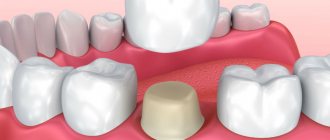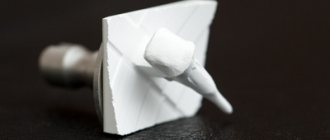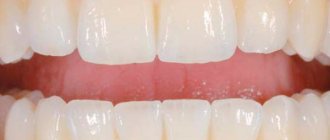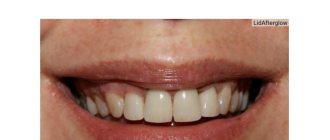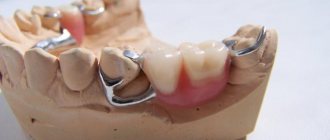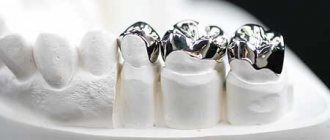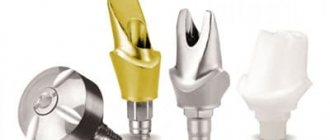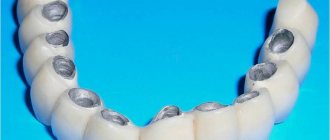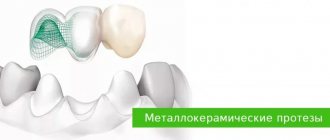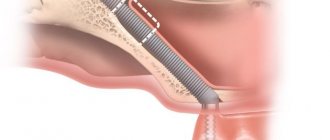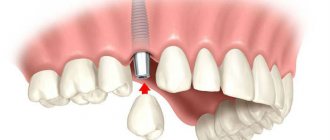Dentistry Apex-D / Dental implantation
Dental implantation is the most physiological method of restoring lost teeth, both single and multiple dentition defects. Thanks to dental implantation, it is possible to restore the function of teeth to the fullest extent - chewing, phonetic, aesthetic. Moreover, in matters of aesthetics, other methods of orthopedic dentistry can hardly compete with this technology: dental implants are no different in appearance from ordinary teeth, and in their functional characteristics they even surpass them.
Despite the fact that dental implantation is a relatively young branch of dentistry, the technologies of dental implantology are already well developed and have a significant scientific basis. This allows the installation of implants with very high survival rates (up to 97-98%). This can also be confirmed by specialists from the Apex-D dental implantation clinic, who install dental implants in Khimki . They often communicate with their colleagues in Russia and abroad, so they use the latest achievements in dental implantology in their work. In addition, we work with many dental implant systems, which allows us to find optimal solutions in various clinical situations.
Dental implantation in Kurkino
We offer affordable prices and carry out promotions for dental implantation with a Guarantee.
For patients who need to correct multiple defects in conditions of complete or partial edentia, our clinic has a special offer for dental implantation in Kurkino .
The final cost of installing dental implants in Moscow depends not only on the number of units, but also on the selected dental system, as well as the need for additional operations to build bone tissue.
Implantologist, dental surgeon Ph.D. Dimitrovich Denis Alexandrovich
orthopedic dentist Lyabov Roman Anatolievich
DENTAL IMPLANTATION CLINIC "APEX-D"
You can sign up for a free joint consultation to draw up a treatment plan from the administrator by phone:
+7
Sign up for a consultation
FULL CONSTRUCTION
Cost of implantation of 1 tooth on a turnkey basis:
cost of installing an implant, plug, gum former, work of an implant surgeon, installation of an abutment, work of an orthopedist, impression of the jaw, laboratory services and work of a technician, cost of a metal-ceramic crown*
* cost of zirconium crown
*The cost of dental prosthetics is indicated for the installation of a metal-ceramic crown. When prosthetics on implants with a zirconium crown, the cost increases by 10,000 rubles
* the promotional price for the installation of dental implants is valid for two implants or more
| Implantation system | Implant installation | Installation of the driver | Prosthetics* | TOTAL |
| 20 000 | 3 000 | 20 000 | 43 000 | |
| 20 000 | 3 000 | 20 000 | 43 000 | |
| 40,000 per promotion 35 000 | 5 000 | 40 000 | 85,000 per promotion 80 000 | |
| 40,000 per promotion 35 000 | 5 000 | 40 000 | 85,000 per promotion 80 000 | |
| 40 000 | 7 500 | 40 000 | 87 500 | |
| 40 000 | 5 000 | 40 000 | 85 000 | |
| 40 000 | 5 000 | 40 000 | 85 000 | |
| 25 000 | 5 000 | 25 000 | 55 000 | |
| 20 000 | 3 000 | 20 000 | 43 000 | |
| 20 000 | Installation of the mating part in a complete removable denture 3 000 – 5 000 | |||
Our doctors will select the best solution to the problem of missing one or more teeth, help you understand complex issues and draw up a plan for successful dental treatment.
How to choose an abutment
to unequivocally answer the question of which abutment is better . The doctor considers each situation individually and makes decisions.
General recommendations include the following.
- If the angle of inclination of the teeth is large, an angled abutment will be required.
- If the mucosa is thin and the patient is prone to stomatitis, a structure with sharp edges cannot be installed.
- The thickness of the product should be such as to prevent contact with adjacent teeth, as this causes their destruction.
Price is another choice parameter. Improved technologies today offer worthy examples even among budget models.
What is a dental implant?
A dental implant is an artificial tooth root, which is designed to replace a lost or so damaged tooth that it is no longer possible to restore it using the methods and means of therapeutic dentistry. It is installed in the bone tissue of the upper or lower jaw, integrated into it and becomes a complete replacement for the tooth root. Such an implant can become a replacement for one lost tooth, and can also be used as a support for subsequent prosthetics to restore multiple dentition defects.
The key concept in dental implantology is osseointegration. This is the process of fusion of the implant with the bone tissue into which it is placed. That is why the material for it is most often titanium or its alloys, which have high osseointegration rates. Thus, the implant is not just tightly installed in the upper or lower jaw, it grows into it and in this regard almost completely corresponds to the root of a regular tooth.
Currently, there are many forms and designs of dental implants, which allows the dentist to solve a variety of problems in various clinical situations. Many companies, both foreign and domestic, are involved in their development and production; due to competition between them, prices for dental implants have noticeably decreased in recent years.
Material
The production of individual abutments is in demand, since dentists claim that this type of design is more reliable. For their manufacture, zirconium dioxide is used, which has maximum similarity to a natural tooth, is durable, compatible with the body, and also has a long service life.
When using a zirconium connector, the shape of the gum is correctly restored after implantation; bacteria do not develop on zirconium. The tooth is easy to install. Subsequently, the denture is no different from other teeth, since it is overgrown with gum, which does not happen when using metal.
Dental implantation: features and benefits
With the help of dental implants, you can not only replace lost teeth, but also do so with the highest possible end result. There is no need to talk about the aesthetic effect - it far exceeds the results of prosthetics using other methods and means of orthopedic dentistry. But no less important are the potential capabilities of dental transplantology in restoring dentition defects.
Firstly, installing implants does not require grinding down adjacent teeth. Secondly, even to replace end defects, fixed prostheses can be used (without implantation, the patient is forced to use removable ones). Thirdly, with the help of prosthetics on implants, it is possible to replace dental defects of any duration - even in the absence of teeth.
A very important feature of dental implantation is that it prevents bone tissue atrophy at the site of the missing tooth. If a bridge is installed in this place, the bone tissue atrophies due to lack of load. A dental implant creates the necessary load on the area of bone tissue and thereby preserves its volume and structure.
And, finally, the presence of beautiful and physiologically complete teeth significantly increases a person’s psychological status. With such teeth, even artificial ones, he feels much more confident among colleagues, friends, family and friends. It is safe to say that dental implantation is not only a dental procedure, but also largely a psychotherapeutic one.
Which is better: titanium, gold or zirconium
Characteristics of structures depending on the material:
- Titanium - titanium copes well with chewing loads, however, the aesthetics of the restoration will be far from natural, since the material tends to show through the crown.
- Gold Ceramic-On is an alloy with a high gold content of 98%. The finished structure is covered with ceramic mass containing natural minerals, which gives the restoration excellent aesthetics.
- Titanium with cemented zirconia part . The frame of the structure is made of titanium and bonded to an individual zirconium component. The ability to correct the structure and color of the secondary component allows you to achieve high attractiveness when replacing teeth.
- Full zirconium . Made from a monolithic block of zirconium dioxide. Does not cause allergic reactions. Thanks to the color of the material, which is close to the natural shade of the teeth, it does not show through the crown.
- resin abutments . They are used for restoration of the smile area with temporary cement-fixed structures. They can be installed for up to 6 months during implantation treatment.
Titanium can be seen through the gum, so titanium components are primarily used in masticatory restorations. For the frontal area, it is better to use abutments made of materials whose color matches the natural color of the teeth.
Indications and contraindications
Contraindications to the installation of implants are diseases and dysfunctional disorders that lead to a significant deterioration of the patient’s condition. These include type 2 diabetes, collagenosis, malignant neoplasms, blood clotting disorders, diseases that lead to a decrease in the regenerative abilities of bone tissue. It is not recommended to carry out dental implantation in the presence of acute inflammatory diseases of the oral mucosa, periodontitis, malocclusion and rapid tooth wear (including bruxism), diseases and anatomical features of the structure of the upper and lower jaw that preclude the installation of implants. Most of these contraindications are relative, that is, if the patient’s condition improves or the cause that makes implantation difficult is eliminated, it can still be performed.
Classic clinical indications for dental implantation are the following dental defects:
- Single. Simply put, it is the absence of one tooth when there are normal healthy teeth next to the defect. In this case, installing an implant will avoid grinding down adjacent teeth to install a bridge.
- Limited. If there are no 2-3 teeth in the dentition, but due to some circumstances it is not possible to install a bridge (or for the same reason - reluctance to grind down adjacent teeth), an implant can become a support for the prosthesis.
- Terminal. The last teeth in the dentition are usually used as support for the installation of dentures. If there is no such support point, then it is impossible to install a prosthesis. For prosthetics on implants, such a problem does not exist - they can be installed anywhere, including in place of missing teeth at the end of the dentition.
- Complete absence of teeth. Until recently, there was only one option for prosthetics in such cases - removable prosthetics. Now such patients are fitted with implants, which become a support for fixed dentures. Prosthetics on implants is especially indicated for edentia, which is accompanied by a decrease in the height of the alveolar processes. There is also a psychological nuance: many people are simply not mentally prepared to wear removable dentures.
And finally, the most important indication for dental implantation is the patient’s desire. If he wants to have beautiful and functional teeth, no one can forbid him from doing so.
Abutment Manufacturers
Israeli, European and American manufacturers offer their products to the market. The standard abutment is constantly being improved, and the manufacturer is expanding its product range to satisfy patient needs.
Among the most popular manufacturers:
- Nobel BioCare (Switzerland), products are characterized by a lifetime guarantee, survival rate – 99%;
- Xive (Germany), characterized by high precision, has a patented thread system;
- Alpha Bio (Israel), inexpensive and high-quality products with a high degree of engraftment with soft tissues;
- Astra Tech (Sweden and USA), titanium abutments with a special coating containing fluoride, which improves hygiene and accelerates bone regeneration;
- Straumann (Switzerland), the material used is an alloy of zirconium dioxide and titanium, which reduces the healing time to 1 month.
Dental implantation in Khimki – prices
Currently, there are quite a lot of dental implantation clinics , Moscow , of course, is no exception. However, many people are put off by the prices of dental implants in Moscow . It is worth admitting that the prices for dental implantation in Moscow are really quite high. This is determined by the rather high cost of the dental implantation systems themselves, and the rather labor-intensive process of preparing for the procedure and its implementation. Often, prices for installing a dental implant in Moscow are inflated due to the “status” of the clinic and the prohibitively high costs of renting premises, purchasing equipment and consumables.
If you are looking for a good clinic and want to get the best price/quality ratio, pay attention to the Apex-D dental implantation clinic, which installs dental implants in Khimki . Highly professional specialists with extensive experience in dental implantology, working on modern equipment, having at their disposal a wide selection of dental implantation systems - all this will allow you to install implants that best meet your requirements and wishes. The doctors of our clinic will help you choose implants that fully correspond to any clinical situation that requires prosthetics on implants. Well, the prices will satisfy patients with different income levels; in any case, we will select the most acceptable prices for dental implants in Moscow .
Zirconium dioxide crowns: methods of attachment to an implant
Today there are 2 ways of attaching crowns to an abutment - screw and cement. Each of them has its own advantages and disadvantages.
With screw fastening, the doctor makes a hole in the crown and connects the parts of the structure with a screw. This occurs outside the patient's mouth. The hole is then closed with filling material. The advantage of this type of structure is the ability to disassemble it and replace the crown if necessary. The disadvantage is the rigidity of the structure.
With the cement method, the crown is attached to the implant, as with a conventional crown installation, using special cement. This method allows for greater maneuverability with the angle of the crown, which allows for greater anatomical compatibility and a natural position of the new tooth in the patient’s mouth. Disadvantages - the structure is not removable. If excess cement gets under the gum, an inflammatory process can begin.
